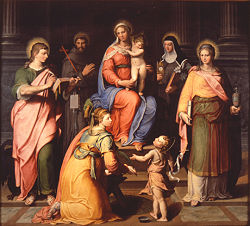
Giovanni Battista Ramenghi (1521, Bologna - 1601, Bologna) was an Italian painter. He is sometimes known as Bagnacavallo junior or Bagnacavallo the Younger to distinguish him from his father Bartolomeo Ramenghi (known as Bagnacavallo). [1]

Giovanni Battista Ramenghi (1521, Bologna - 1601, Bologna) was an Italian painter. He is sometimes known as Bagnacavallo junior or Bagnacavallo the Younger to distinguish him from his father Bartolomeo Ramenghi (known as Bagnacavallo). [1]
He trained in his father's studio and accompanied Primaticcio on his trip to France, where he was influenced for a time by the Fontainebleau School. Working to meet the strictures of the Counter-Reformation, Ramenghi was one of the most conservative painters of the Bolognese school of the time, moving on from Raphael but refusing to be influenced by the early work of the young Annibale Carracci